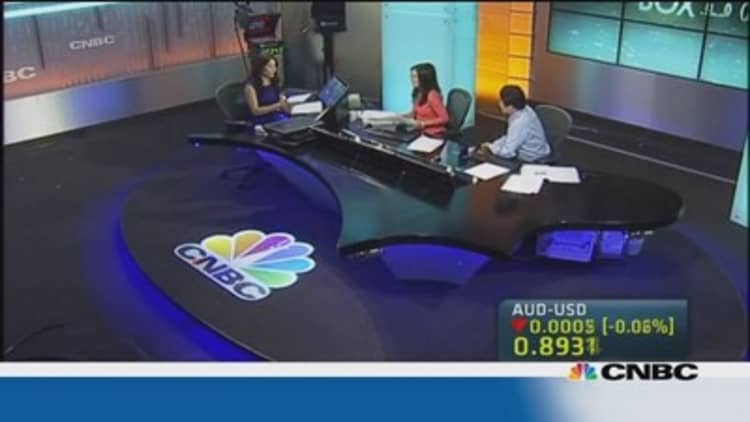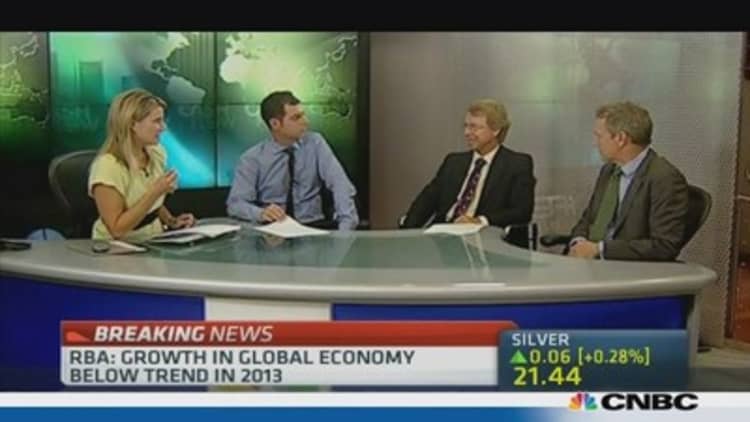Asian equities were a mixed sight on Tuesday as shares, in particular Tokyo and Sydney, clawed back losses from an acute selloff in the previous session, fueled by brewing instability in Ukraine.
Investors were also cautious ahead of China's National People's Congress on Wednesday.
Commenting on Monday's risk aversion in financial markets, Patrick Chovanec, Chief Strategist at Silvercrest Asset Management told CNBC's Asia Squawk Box, "The geopolitical significance of (Ukraine) is huge. The economic (impact), not so much."
(Read more: Why market panicover Ukraine may be 'short-term')
"I think it is important to put into perspective that Ukraine's gross domestic product (GDP) is only about 7 percent of Greece and it is not part of any global supply chain... So i think markets are a little over reacting to the economic impact, even if things get worse in Ukraine," he added.
Russia on Monday cemented its control over Ukraine's Crimean peninsula after Russian President Vladimir Putin declared he had the right to invade his neighbor. As the crisis deepened, the United States has suspended all military engagements with Russia, including military exercises and port visits, as part of Washington's response.
U.S. stocks declined sharply on Monday, as worries about Russian intervention in the Ukraine sent investors fleeing from risk assets.
Data showing U.S. factory activity rebounded from an eight-month low in February and a bigger-than-expected increase in consumer spending were overshadowed by the focus on Ukraine.
The Dow Jones Industrial Average closed 1 percent lower, its biggest one-day loss in a month, with all of its components finishing in the red. The S&P 500 fell 0.8 percent while the tech-heavy Nasdaq lost 0.7 percent.

Shanghai 0.2% lower
Mainland shares bounced between gains and losses on Tuesday, ahead of the government's annual meeting due to start on Wednesday.
At midday, the Shanghai Composite index was down nearly 1 percent but eventually managed to trim losses later in the session. Still, the index effectively snapped a four-day winning streak.
"At this point, there is little reason for people to be too active in the market. There's the Ukraine situation and some have positioned for the meetings in China, in anticipation of supportive policies," said Jackson Wong, vice president for equity sales at Tanrich Securities to Reuters.
Among losers, Shandong Gold erased a 1 percent gain to slump 2.4 percent. However, fellow gold stocks Zijin Mining rallied 0.5 percent, on rising prices of the precious metal which received a boost from safe-haven buying amid uncertainty in Eastern Europe.
Property developer Vanke climbed 4 percent, on news that it now has regulatory approval to move its B-share listing to Hong Kong, more than a year after the plan was mooted.
(Read more: China minting billionaires at 'phenomenal' rate)
Tokyo up 0.5%
A weaker yen lifted Japan's benchmark Nikkei into positive territory on Tuesday. The Japanese currency traded at 101.8 against the greenback on late Tuesday, significantly weaker than Monday's one-and-a-half-week high of 101.22.
Stocks cheered a weaker currency; Exporter stocks Panasonic gained 2.3 percent while E-commerce Rakuten advanced nearly 3 percent.
February auto sales from the U.S. dominated shares of Japanese automakers for the day. Toyota Motor got a boost by 0.7 percent, after news that it's expecting more sales in Europe this year soothed concerns about declining February sales in the U.S.

Nissan went down over 1 percent, despite a 15.8 percent on-year rise in U.S. sales for February.
Fast Retailing piled on over 1 percent, on Monday's news that its Uniqlo Japan sales rose 0.8 percent on year following strong demand for its winter products due to the cold weather. The retailer will be listing in Hong Kong on Wednesday.
Sydney up 0.3%
After posting its biggest one-day decline in a month in the previous session, Australia's S&P ASX 200 index claimed modest gains on Tuesday to recover from Monday's steep declines.
(Read more: Can Russia take the strain of Ukraine intervention?)
Investors reacted to news on Australia's current account deficit, which was better than analysts' expectations, narrowing to A$10.14 billion in the fourth-quarter of 2013 from the previous quarter. Upbeat building approvals data also lifted sentiment.
Banking stocks were upbeat, as the Reserve Bank of Australia announced that it would keep interest rates on hold at a policy meeting on late Tuesday. This was in line with market expectations. The central bank cited a revival in housing and consumption for its decision.

Commonwealth Bank of Australia rose 0.6 percent, while Australia and New Zealand Bank and Westpac climbed 0.7 and 1 percent each.
Struggling flag carrier Qantas was in focus after the Australian government agreed to loosen restrictions on foreign ownership of the airline. However, Opposition Labor politicians said the plan would not pass parliament, even with a new Senate in July. Shares of Qantas dunked 1.3 percent on Tuesday.
Paring gains was AGL Energy which dropped nearly 3 percent, on news that the Australian Competition and Consumer Commission blocked the state government's plan to sell Macquarie Generation to the company on competition concerns.
After moving ahead on safe-haven buying into the precious metal, gold stocks fell on Tuesday, limiting gains on the bourse. Evolution Mining and Kingsgate plunged 2 and 4 percent each; Alacer Gold was the sole exception with a 2.4 percent gain.
(Read more: Co-investment:The new buzz word in private equity)
Seoul dips 0.6%
South Korean shares remained spooked by Ukraine's crisis. The benchmark Kospi index extended Monday's worst daily fall in nearly a month to hit a one-week low on Tuesday.
Some analysts say investors may also be awaiting news of China's annual meeting. "Investors are waiting to see what growth targets or stimulus-related comments will be offered from China," Chung Seung-jae, Analyst from Mirae Asset Securities told Reuters.
Among losers, Hyundai Motor was in the doldrums by 1.6 percent on news that its car sales fell 6.8 percent from a year earlier.
Blue-chip stocks Samsung and Posco weighed on the bourse with declines of 0.8 and 2.1 percent respectively. The latter was hit by continued worries that a slowdown in China would hurt its steel- making demands and earnings.
Meanwhile, investors may be digesting to news that South Korea's president nominated a former senior deputy chief of the central bank to be its next governor, with the mission of ensuring price stability in Asia's fourth-largest economy.
— Follow us on Twitter: @CNBCWorld

